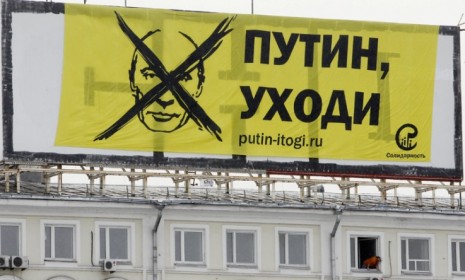Could Vladimir Putin really face a 'Russian Spring'?
Though the resilient Russian leader is still a near-lock to win back the presidency next month, anti-Putin protests are growing

A free daily email with the biggest news stories of the day – and the best features from TheWeek.com
You are now subscribed
Your newsletter sign-up was successful
In the largest protests Russia has seen since the fall of the Soviet Union, tens of thousands of people flooded Moscow's streets in recent days demanding fair elections and the end of Vladimir Putin's "corrupt" government. Putin was president from 2000 to 2008. Barred from a third consecutive term, he has spent the last four years serving as prime minister while his hand-picked successor, Dmitry Medvedev, held the presidency. Putin is widely expected to reclaim the presidency in March elections, a scenario which one opposition leader warns could trigger "Russian Spring" protests. Is that realistic and what might it lead to?
The tide is turning against Putin: "Opposition demonstrations have utterly changed the political atmosphere in Russia," says Gideon Rachman at Business Day. Riled up by Putin's United Russia party's rigged parliamentary election victory in December, marchers are carrying signs reading "Mubarak, Gadhafi, Putin." And it's true — "the end of the Putin era is in sight." Just listening to "the insults hurled at Putin" by Russian protesters and "the intoxicating sense that taboos are being broken is reminiscent of the outbreak of glasnost under Mikhail Gorbachev."
"Ice starts to crack under Putin in 'Moscow thaw'"
The Week
Escape your echo chamber. Get the facts behind the news, plus analysis from multiple perspectives.

Sign up for The Week's Free Newsletters
From our morning news briefing to a weekly Good News Newsletter, get the best of The Week delivered directly to your inbox.
From our morning news briefing to a weekly Good News Newsletter, get the best of The Week delivered directly to your inbox.
Be careful what you wish for: I love seeing Russians protest Putin's "heavy-handedness and corruption," says Raymond Sontag at The American Interest. But if this is the start of a Russian Spring, the protesters could be headed for the same turmoil and violence from which Putin claims to have saved them in the 1990s. In a country like Russia that lacks strong freedom-promoting institutions, it does not necessarily follow that reformers toppling dictators will lead to true democratization. Remember, "such revolution can easily lead... right back to the authoritarianism it sought to displace."
Russians are mad, but not that mad: Obviously, Russians "who take to the streets are upset," Fyodor Lukyanov, editor-in-chief of Russia's Global Politics journal, tells Agence France Presse. But this is no Arab Spring. What Russians "want is more prosperity, more prospects for the future, not a revolution." The tensions tearing apart Arab countries just aren't present in Russia, and as long as the government reacts with restraint, Putin won't be toppled anytime soon.
"Russia still far from its 'Arab Spring': Analysts"
A free daily email with the biggest news stories of the day – and the best features from TheWeek.com
-
 How to Get to Heaven from Belfast: a ‘highly entertaining ride’
How to Get to Heaven from Belfast: a ‘highly entertaining ride’The Week Recommends Mystery-comedy from the creator of Derry Girls should be ‘your new binge-watch’
-
 The 8 best TV shows of the 1960s
The 8 best TV shows of the 1960sThe standout shows of this decade take viewers from outer space to the Wild West
-
 Microdramas are booming
Microdramas are boomingUnder the radar Scroll to watch a whole movie
-
 The billionaires’ wealth tax: a catastrophe for California?
The billionaires’ wealth tax: a catastrophe for California?Talking Point Peter Thiel and Larry Page preparing to change state residency
-
 Bari Weiss’ ‘60 Minutes’ scandal is about more than one report
Bari Weiss’ ‘60 Minutes’ scandal is about more than one reportIN THE SPOTLIGHT By blocking an approved segment on a controversial prison holding US deportees in El Salvador, the editor-in-chief of CBS News has become the main story
-
 Has Zohran Mamdani shown the Democrats how to win again?
Has Zohran Mamdani shown the Democrats how to win again?Today’s Big Question New York City mayoral election touted as victory for left-wing populists but moderate centrist wins elsewhere present more complex path for Democratic Party
-
 Millions turn out for anti-Trump ‘No Kings’ rallies
Millions turn out for anti-Trump ‘No Kings’ ralliesSpeed Read An estimated 7 million people participated, 2 million more than at the first ‘No Kings’ protest in June
-
 Ghislaine Maxwell: angling for a Trump pardon
Ghislaine Maxwell: angling for a Trump pardonTalking Point Convicted sex trafficker's testimony could shed new light on president's links to Jeffrey Epstein
-
 The last words and final moments of 40 presidents
The last words and final moments of 40 presidentsThe Explainer Some are eloquent quotes worthy of the holders of the highest office in the nation, and others... aren't
-
 The JFK files: the truth at last?
The JFK files: the truth at last?In The Spotlight More than 64,000 previously classified documents relating the 1963 assassination of John F. Kennedy have been released by the Trump administration
-
 'Seriously, not literally': how should the world take Donald Trump?
'Seriously, not literally': how should the world take Donald Trump?Today's big question White House rhetoric and reality look likely to become increasingly blurred